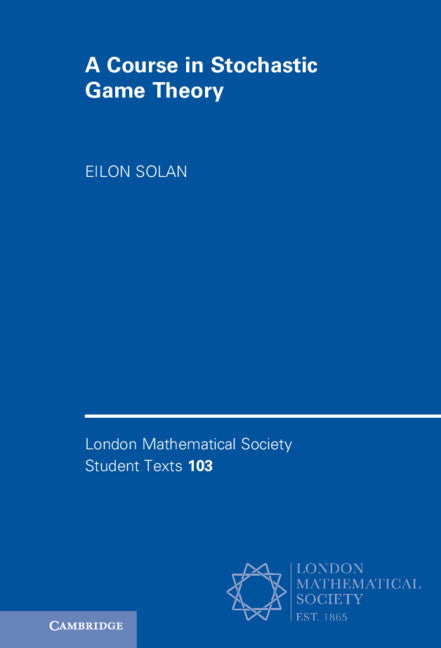Freshly Printed - allow 8 days lead
Couldn't load pickup availability
A Course in Stochastic Game Theory
This book for beginning graduate students presents a course on stochastic games and the mathematical methods used in their analysis.
Eilon Solan (Author)
9781316516331, Cambridge University Press
Hardback, published 26 May 2022
275 pages
23.5 x 15.8 x 2 cm, 0.57 kg
'The book presents a course on the theory of stochastic games. It is self-contained and accessible at an undergraduate level. Instead of seeking the most general results and the broadest spectrum of knowledge in the field, the author prefers firstly to focus with great care on the most central aspects of the theory and then analyses more specifically some particular classes of stochastic games.' Catherine Rainer, zbMATH
Stochastic games have an element of chance: the state of the next round is determined probabilistically depending upon players' actions and the current state. Successful players need to balance the need for short-term payoffs while ensuring future opportunities remain high. The various techniques needed to analyze these often highly non-trivial games are a showcase of attractive mathematics, including methods from probability, differential equations, algebra, and combinatorics. This book presents a course on the theory of stochastic games going from the basics through to topics of modern research, focusing on conceptual clarity over complete generality. Each of its chapters introduces a new mathematical tool – including contracting mappings, semi-algebraic sets, infinite orbits, and Ramsey's theorem, among others – before discussing the game-theoretic results they can be used to obtain. The author assumes no more than a basic undergraduate curriculum and illustrates the theory with numerous examples and exercises, with solutions available online.
Introduction
1. Markov decision problems
2. A Tauberian theorem and uniform ?-optimality in hidden Markov decision problems
3. Strategic-form games – a review
4. Stochastic games – the model
5. Two-player zero-sum discounted games
6. Semi-algebraic sets and the limit of the discounted value
7. B-Graphs and the continuity of the limit $lim_{lambda o 0} v_lambda(s
q,r)$
8. Kakutani's fixed-point theorem and multi-player discounted stochastic games
9. Uniform equilibrium
10. The vanishing discount factor approach and uniform equilibrium in absorbing games
11. Ramsey's theorem and two-player deterministic stopping games
12. Infinite orbits and quitting games
13. Linear complementarity problems and quitting games
References
Index.
Subject Areas: Algorithms & data structures [UMB], Game theory [PBUD], Microeconomics [KCC], Risk assessment [GPQD]


